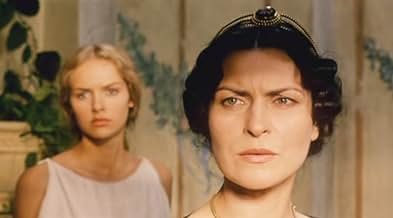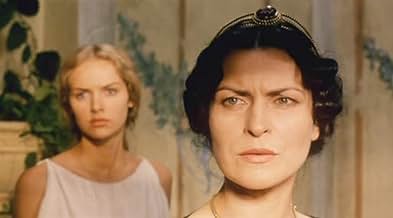Quo vadis
- 2001
- 2h 45min
CALIFICACIÓN DE IMDb
5.7/10
2.4 k
TU CALIFICACIÓN
Un oficial romano y una mujer cristiana, hija adoptiva de un militar de alto rango, se enamoran.Un oficial romano y una mujer cristiana, hija adoptiva de un militar de alto rango, se enamoran.Un oficial romano y una mujer cristiana, hija adoptiva de un militar de alto rango, se enamoran.
- Dirección
- Guionistas
- Elenco
- Premios
- 4 premios ganados y 2 nominaciones en total
- Dirección
- Guionistas
- Todo el elenco y el equipo
- Producción, taquilla y más en IMDbPro
Opiniones destacadas
Jerzy Kawalerowicz's Quo Vadis is a great adaptation, based on the novel by the Nobel Prize winner, Henryk Sienkiewicz. This is one of those films which make you wonder: What are our priorities in life? You cannot just leave the cinema and go back to reality and forget what you've seen. Wonderful acting is an unquestionable virtue of this Quo Vadis. Saint Peter played by Franciszek Pieczka, is not the esteemed, serious Saint Peter we can see on paintings or sculptures in churches, he's not this stern guardian at heaven's gate, the one who keeps the key to heaven. Ke is an eye witness of Christ's life and death, and he is a sage you may ask for advice in difficult moments of your life. He is one of us - the man who understands the love of young people - Marek and Ligia, and doesn't find anything wrong in it.
Jerzy Trela, in my opinion, in the role of his lifetime as Chilon, starts off as a comic character, as a cheater, plotter, unscrupulous liar, who isn't afraid to bertray people causing their death. For such a role, so comic and tragic, a great actor is needed. Jerzy Trela is undoubtedly a wonderful artist, the right actor for this role. I was crying with laughter at the beginning, and of emotion at the end of the film, watching his Chilon Chilonides.
A good idea, I think, was giving the role of Neron to a singing actor, Micha³ Bajor. This red-haired artist created a wonderful character, despite the role being so difficult. His musical and singing talents were spot on this film.
The best female performance was Ma³gorzata Pieczyñska's role of Acte, the only woman who really loved Neron - a love expressed so convincingly.
A breathtaking scene is the fight between Ursus (Rafa³ Kubacki) and the bull, especially, considering there were no computer or other special effects. Although Rafa³ Kubacki clearly isn't a professional actor, his fighting skills and sheer on screen power are worthy of respect.
Quo Vadis isn't a Hollywood style film. This film is not like Cleopatra or Gladiator. Comparing Quo Vadis to these films is a pointless exercise. The only thing these films have in common is the place of action: ancient Rome. The rest is quite different. The last scene of the film (I hope you will watch this film, and see this scene) begs the question: "Quo Vadis XXIst century world?"
Jerzy Trela, in my opinion, in the role of his lifetime as Chilon, starts off as a comic character, as a cheater, plotter, unscrupulous liar, who isn't afraid to bertray people causing their death. For such a role, so comic and tragic, a great actor is needed. Jerzy Trela is undoubtedly a wonderful artist, the right actor for this role. I was crying with laughter at the beginning, and of emotion at the end of the film, watching his Chilon Chilonides.
A good idea, I think, was giving the role of Neron to a singing actor, Micha³ Bajor. This red-haired artist created a wonderful character, despite the role being so difficult. His musical and singing talents were spot on this film.
The best female performance was Ma³gorzata Pieczyñska's role of Acte, the only woman who really loved Neron - a love expressed so convincingly.
A breathtaking scene is the fight between Ursus (Rafa³ Kubacki) and the bull, especially, considering there were no computer or other special effects. Although Rafa³ Kubacki clearly isn't a professional actor, his fighting skills and sheer on screen power are worthy of respect.
Quo Vadis isn't a Hollywood style film. This film is not like Cleopatra or Gladiator. Comparing Quo Vadis to these films is a pointless exercise. The only thing these films have in common is the place of action: ancient Rome. The rest is quite different. The last scene of the film (I hope you will watch this film, and see this scene) begs the question: "Quo Vadis XXIst century world?"
Inevitably, this film begs comparison to the three other recent Polish historical "super-productions", Ogniem i Mieczem, Pan Tadeusz, and Przedwiosnie. Quo Vadis isn't made with quite the elegance and visual grace of Pan Tadeusz, nor is it quite as dynamic and classy as Przedwiosnie, although it is elegant, visually graceful, and dynamic. It shares similarities, unfortunately, with Ogniem i Mieczem as well: at times it reverts to Hollywood-style kitsch, such as with close-ups that take themselves too seriously, and tacky, forced, over-dramatic music. However, these elements are both less frequent and less pronounced than in Ogniem i Mieczem; and - if you allow yourself to ignore them - are overpowered by many positive elements.
Boguslaw Linda is great as Petroniusz. This is, I think, one of his best roles for years, and he produces the grace and dignity of a Roman gentleman very well. Michal Bajor's characterisation of the naive, vain Nero, at once contemptible and likeable, was for me one of the nice surprises of the film.
The scene where lions tear Christians apart in the circus is shocking and heart-wrenching, and looks almost as realistic as I could imagine is possible. The famous scene where Ursus battles the bull in the circus is, if not as spectacular as the lions, similarly effective.
Not a masterpiece, but a very good film. 8/10
Boguslaw Linda is great as Petroniusz. This is, I think, one of his best roles for years, and he produces the grace and dignity of a Roman gentleman very well. Michal Bajor's characterisation of the naive, vain Nero, at once contemptible and likeable, was for me one of the nice surprises of the film.
The scene where lions tear Christians apart in the circus is shocking and heart-wrenching, and looks almost as realistic as I could imagine is possible. The famous scene where Ursus battles the bull in the circus is, if not as spectacular as the lions, similarly effective.
Not a masterpiece, but a very good film. 8/10
Like summary states Polish is out of my leauge....but this quite wonderful movie isn't for me or any epic movie fan. VERY well done..with great sets,costumes and visuals. (I think the cinematography is beautifully done) The main characters look right and knowing the 1951 version of "Quo" as I do, I can follow their actions easily. In fact their appearance seems to make them more believable than previous versions of the movie.Sequences set in the "Circus" are realistic and in final scene closer to the novel. The entire movie is pretty wonderful and I think it's $18 million dollar budget shows. It's lavishly done. A worthy successor to MGM's version. Best, Mike M.
I recently saw this film during my vacation in Poland, there was a lot of anticipation for this film due to the fact that it was the first Polish production of the famous book, and because it was the most expensive Polish film production in history. However the film failed to live up to its expectations on may levels. The beginning seems rushed, I remember there being more development in the novel than was shown in the movie. I could understand if the filmmakers wanted to speed up the tempo but, in this case they missed the correct pace and as a result it distanced me from the characters and plot. The movie slows down as it progresses but by that time I was already too far away to really care about what was happening. Another place where it fails is in the casting of the characters. Ligia is played by a model, who has not done any acting prior to this role, and it shows. She is never able to convincingly portray any emotions, which is another reason why I did not care much for her. Considering Ligia is one of the key roles in the film, it should have been cast with an actress with more experience, the film makers seemed to value looks over experience, and in my opinion it was a bad choice. The casting of Boguslaw Linda as Petronius raised some doubts too, as this is an actor who is frequently type cast into action roles. However his performance was one of the few enjoyable parts of the movie, was he was able to break away from his mold, and provide a solid and enjoyable portrayal of Petronius. Lastly the movie fails on its production value. It is hard to believe that so much money was in fact spent on the film. Many of the scenes look like they were set in a studio and not Rome. Which again distanced me from where I was supposed to be. The special effects leave something to be desired also. They look like TV quality effects rather than effects created for a film. I hope a large part of the budget was not spent on them. The movie had a lot of potential, and it should have been given a better treatment. Polish cinema can do much, much, better, and hopefully someday it will. A lot of money was spent on this movie, it's too bad that more thought did not go into it as well.
This new Polish version of a Polish novel, written in the 1890's by Henryk Sienkiewicz (who won the Nobel prize), is an excellent movie, gripping, exciting and deeply moving. Unlike the 1951 MGM version, which was a costume epic typical for its time, this new film seems to be about real people caught in the maelstrom that was Nero's Rome, in the struggle between decadent paganism and the emerging new faith of the Christians. The book is a favorite of mine and the screenplay's fidelity to the novel is highly commendable. The actors are vivid in their portrayals. This Nero, for instance, seems like a real madman, not a fine actor hamming it up (as did Ustinov in the 1951 film). The Petronius is excellent, the two leads both young and handsome. The conversion of Vinicius and Chilon are convincing and moving. This nearly-three-hour film moves quickly and covers a lot of ground. The ending gave me pause, and it's a stunner. The movie deserves a much wider audience than it's going to get in the US, because, face it, most people who go see foreign language films are not the same people who go to see religious, historical epics. I hope it gets a video release, at least. Hollywood would have given this film costlier and better special effects - the burning of Rome is a bit anemic - but Hollywood could not have filmed this movie as honestly, truthfully and brilliantly.
¿Sabías que…?
- TriviaNever given a wide release in the U.S., its only engagement (so far) in the U.S. was in Los Angeles, California, in 2002. The film has also never been shown on U.S. cable television.
- ErroresIn the final episode the Emperor Nero is fleeing Rome, afraid of being killed by the mob or the new Emperor Galba. He attempts to hide in a thicket of prickly pear cactus and agave plants, both of which are native to the Americas and unknown in Europe until the 1500s, approximately 1450 years after Nero's death.
- Versiones alternativasOn December 25, 2003 the first channel of Polish public television aired first episode of the television version of the movie. It contains of six episodes and is more than 100 minutes than the theatrical edition. Many scenes, previously deleted, were included in the mini-series.
- ConexionesVersion of Quo Vadis? (1901)
Selecciones populares
Inicia sesión para calificar y agrega a la lista de videos para obtener recomendaciones personalizadas
- How long is Quo vadis?Con tecnología de Alexa
Detalles
- Fecha de lanzamiento
- Países de origen
- Sitios oficiales
- Idioma
- También se conoce como
- Quo Vadis Domine
- Locaciones de filmación
- Productoras
- Ver más créditos de la compañía en IMDbPro
Taquilla
- Presupuesto
- USD 18,000,000 (estimado)
- Tiempo de ejecución2 horas 45 minutos
- Color
- Mezcla de sonido
- Relación de aspecto
- 1.85 : 1
Contribuir a esta página
Sugiere una edición o agrega el contenido que falta

Principales brechas de datos
By what name was Quo vadis (2001) officially released in India in English?
Responda





































